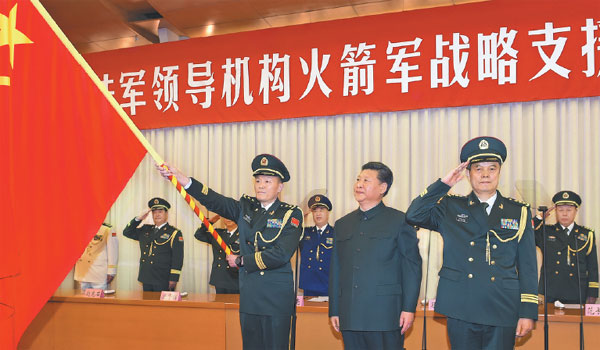Three new military branches created in key PLA reform
President announces 'new type of combat force', with improved integration, efficiency
The People's Liberation Army made a historic reshuffle of its branches on Thursday, as military reforms ordered by President Xi Jinping gradually unfold.
During a ceremony held at the Central Military Commission office building in Beijing, Xi, who is also chairman of the commission, announced the establishment of the PLA Army Headquarters, the PLA Rocket Force and the PLA Strategic Support Force.
|
President Xi Jinping passed the flag of the People's Liberation Army to Gao Jin (left), commander of the PLA Strategic Support Force, at an inauguration ceremony for three new military units in Beijing on Friday. Li Gang / Xinhua |
The moves are a key milestone in the modernization efforts of the Chinese military, Xi said.
The president asked the Army to improve its information and joint operation capabilities. He urged the Rocket Force to enhance nuclear deterrence and counterstrike capacity and to strengthen medium- and long-range precision strike capabilities.
Speaking of the Strategic Support Force, Xi said the new branch is a "new type of combat force", and he asked it to improve the integration of the PLA's support systems and the links between civilian and defense sectors.
Based on earlier reports by PLA Daily, the Strategic Support Force will take charge of a wide range of support functions, such as intelligence, technical reconnaissance, electronic warfare and logistics.
Previously, the PLA's ground force did not have a headquarters, as its units were under the direct control of the Central Military Commission. The seven regional military commands were in charge of the detailed operations of ground units stationed within their jurisdictions.
The Rocket Force's predecessor, the PLA Second Artillery Corps, was formed in 1966 to manage the country's strategic missiles. Its name was given by then-premier Zhou Enlai in an attempt to keep its true functions secret. The missile force made its public debut in 1984.
At a Friday news conference, Defense Ministry spokesman Yang Yujun said the establishment of the Rocket Force doesn't mean China is changing its nuclear policy or strategy.
Reiterating the no-first-use nuclear weapons policy and the country's defensive nuclear strategy, Yang said China always keeps its nuclear capability at the minimum level required for safeguarding its national security.
The Rocket Force will act as a core part of strategic deterrence, buttressing the country's position as a major power, and an important building block in upholding national security, Yang said.
Lou Yaoliang, head of military strategy studies at National Defense University, said that although the PLA has been reforming for years, this latest round guided by Xi will be "the biggest one in terms of strength, scope, the difficulties it will meet and its impact".
He said the establishment of leading organs for the PLA Army is a highlight. In the past, more than 20 PLA central departments were in charge of various aspects of the ground force, leading to a host of obstacles in the effort to build a strong army, Lou said.
"The establishment of the Army Headquarters also means the PLA has begun to change its long-held Army-centered mentality," he said.
Yao Yunzhu, a senior researcher at the PLA Academy of Military Science, said the establishment of the Strategic Support Force will integrate the support forces of different services to improve efficiency and save costs.
In another development on Friday, the Central Military Commission released guidelines on the military reform, saying reforms will focus on the PLA's structure and organization in 2016.
Xi announced in September that China would cut its troops by 300,000, with noncombatant agencies and their personnel being the primary target of the cuts.
Contact the writers at zhaolei@chinadaily.com.cn and lixiaokun@chinadaily.com.cn
Latest PLA appointments
1 General Li Zuocheng: Born in Anhua county, Hunan province, in 1953. He had served as commander of the Chengdu Military Area Command since July 2013, before being named the new head of the Army Headquarters on Friday.
2 Lieutenant General Liu Lei: Born in Liaocheng, Shandong province, in 1957. He had served as political commissar of the Lanzhou Military Area Command since 2014. He was appointed as political commissar of the Army Headquarters.
3 General Wei Fenghe: The 62-year-old general was born in Liaocheng, Shandong province. He had been commander of the PLA Second Artillery Corps since October 2012. He was named commander of the PLA Rocket Force.
4 Lieutenant General Wang Jiasheng: Born in Liaoning province in 1955. He had been political commissar of the PLA Second Artillery Corps since December 2014. He was named political commissar of the PLA Rocket Force.
5 Lieutenant General Gao Jin: Born in Jingjiang, Jiangsu province, in 1959. He had served as president of the PLA's Academy of Military Science since December 2014, 26 years of experience in the PLA Second Artillery Corps from 1985 to 2011. On Friday, he was named commander of the PLA Strategic Support Force.
6 General Liu Fulian: Born in Lai'an, Anhui province, in 1953. He served as political commissar of the Beijing Military Area Command from 2009. He was named political commissar of the PLA Strategic Support Force.
China Daily



















